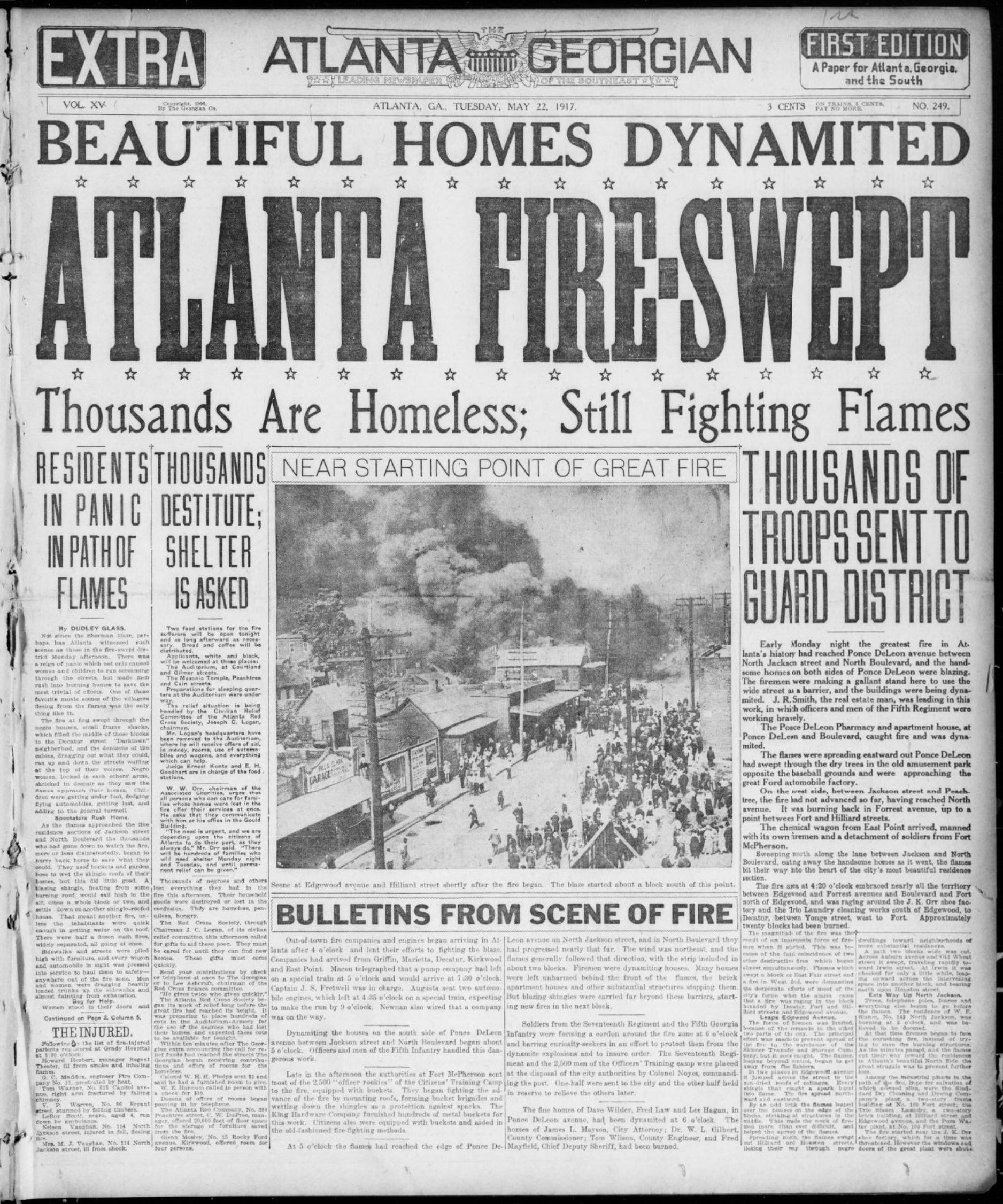The title page of the first edition of the May 22, 1917, issue of the Atlanta Georgian reports on the destruction caused by the Great Atlanta Fire of 1917 and the city’s effort to control the damage.
This issue marks the 3 millionth page digitized by the Digital Library of Georgia.
The newspaper circulated daily from 1906 to 1939, was the first Hearst-owned newspaper in the South, and is the most prominent example of sensationalist yellow journalism in Georgia. In its first year of publication, the paper infamously printed stories intended to inflame racial tensions that contributed to the start of the Atlanta Race Massacre of 1906.
Famed newspaper magnate William Randolph Hearst purchased the Atlanta Georgian in 1912. Under his ownership, the paper printed increasingly scandalous headlines and illustrations that dramatized local crimes, including its coverage of the Leo Frank case in Atlanta.
The digitization of this title was funded through a grant from an anonymous donor as part of their mission to provide resources that promote a greater understanding of Georgia’s history during this important period.
We have developed an online press kit, available at bit.ly/dlg3million which includes:
- An image, description, and link out to our 3 millionth page;
- A link to our press release;
- An interactive map showing which cities and counties in Georgia have newspapers digitized by the DLG;
- Eleven impact stories that demonstrate how digitized historic newspapers have helped people find what they were looking for;
- A link to Covers Dixie Like the Dew”: A History of Newspaper Journalism in Georgia
- A blog post of the 5 favorite newspaper pages written by DLG staff;
- Links to instructional videos on how to use the Georgia Historic Newspapers site.
Since 2007, the DLG has provided access to the state’s historic newspapers, with the majority having been digitized from microfilm produced by the Georgia Newspaper Project (GNP).
With the launch of the Georgia Historic Newspapers (GHN) site in July 2017, the DLG has maintained that tradition by bringing together new and existing resources into a single, consolidated website where newspapers dating from 1763-2023 are full-text searchable and can be browsed by city, title, date, keyword, or region.
Annually, DLG digitizes over 400,000 historic newspaper pages with funding from GALILEO, the University of Georgia Libraries, Georgia Public Library Service, the National Endowment for the Humanities, the Institute for Museum and Library Services, the R. J. Taylor, Jr. Foundation, and dozens of cultural heritage institutions across the state. The DLG also microfilms more than 200 current newspapers. Historic newspaper pages are consistently the most visited of any DLG site.
Researching newspaper content is critical to understanding a location’s local history, priorities, and interests. It can be an engaging way to teach younger students the value of primary sources.
The GHN includes some of the state’s earliest newspapers; important African American, Roman Catholic, and Cherokee newspapers; and issues from Georgia’s largest cities and towns, as well as an increasing number of underrepresented communities and regions.
“I’m happy to see that more of the Georgian will soon be digitized,” said Dr. Janice Hume, the Associate Dean for Academic Affairs at the Grady College of Journalism and Mass Communications.
“Students in my media history class at UGA dig into it to learn about Atlanta in the early 20th century, the Leo Frank trial, and journalism history. They are amazed at the sheer volume of stories, the extras, and the sensationalism.”
Our 3 millionth page:


